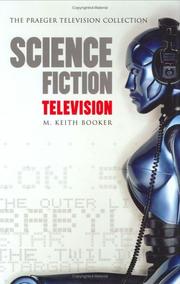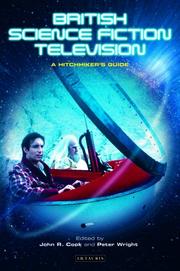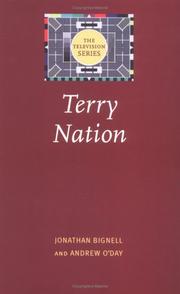| Listing 1 - 10 of 62 | << page >> |
Sort by
|

ISBN: 0275981649 Year: 2004 Publisher: Westport (Conn.) : Praeger,
Abstract | Keywords | Export | Availability | Bookmark
 Loading...
Loading...Choose an application
- Reference Manager
- EndNote
- RefWorks (Direct export to RefWorks)
Book
ISBN: 2130624995 Year: 2013 Publisher: Paris : Presses Universitaires de France,
Abstract | Keywords | Export | Availability | Bookmark
 Loading...
Loading...Choose an application
- Reference Manager
- EndNote
- RefWorks (Direct export to RefWorks)
Œuvre unique, Le Prisonnier occupe une place à part dans le monde des séries télévisées. Cette histoire d'un agent secret britannique, enfermé dans un village en forme de prison à ciel ouvert, a suscité une littérature riche, abondante, voire érudite, depuis la première diffusion de l'œuvre en septembre 1967. Au fil du temps, la série, qui ne comporte pourtant que 17 épisodes et que l'on doit au talent et à la détermination de Patrick McGoohan, s'est transformée en un objet culte, avec ses passionnés et ses exégètes : influencée par son temps – la fin des années 1960 –, elle porte en elle une dimension prophétique qui, quarante-cinq ans après son apparition, conserve toute sa pertinence et son actualité. Elle continue de nous interroger sur la place de l'individu dans le monde : appel à la résistance contre le conformisme grandissant, Le Prisonnier constitue un plaidoyer en faveur de la liberté individuelle et une interrogation sur notre identité.
Book
ISBN: 0226820483 9780226824802 0226824802 9780226820484 Year: 2023 Publisher: Chicago (Ill.): The University of Chicago Press,
Abstract | Keywords | Export | Availability | Bookmark
 Loading...
Loading...Choose an application
- Reference Manager
- EndNote
- RefWorks (Direct export to RefWorks)
"We hear everywhere that we are in a golden era of television. Prestige dramas are the stars of streaming services and cable networks alike, luring viewers into binge watching hours of programming with writing, production values, and acting talent typically associated with feature-length films. In Second Lives, Michael Szalay focuses our attention on a highly influential subset of prestige television that he calls the black-market drama, and he tethers the new renaissance of television to this genre. The black-market drama is a genre that was inaugurated by the HBO series The Sopranos. At its most basic level, it consists of shows in which part or all of a (usually) white, middle-class family leads two lives, one routine and the other typically illegal and dangerous. Those lives might involve black markets or money laundering, a secret past or closeted identity, addiction, prostitution, espionage, or an alternate reality. And those secret lives might be kept from a variety of people, from other family members to neighbors to the state. What matters is that second lives allow characters to awaken from the slumber of their first lives. We, the audience, awaken too. For Szalay, these black-market dramas are the key to understanding how TV, once the lowest of the low, came to be esteemed as never before"--
Fiction television programs --- Television series --- Television programs

ISBN: 9781845110475 1845110471 9781845110482 184511048X Year: 2006 Publisher: London ; New York : New York : I.B. Tauris ; In the United States and Canada distributed by Palgrave Macmillan,
Abstract | Keywords | Export | Availability | Bookmark
 Loading...
Loading...Choose an application
- Reference Manager
- EndNote
- RefWorks (Direct export to RefWorks)
From 'Doctor Who' to 'Red Dwarf, Thunderbirds 'to 'The Hitchhiker's Guide to the Galaxy', some of the most memorable and cherished British television has been in the area of science fiction.This pioneering book, by leading writers in TV history and science fiction, offers for the first time a detailed national survey of this most well-loved of TV genres and provides in-depth reassessments of these shows, as well as others including 'Threads, Sapphire and Steel, Invasion: Earth 'and 'The Last Train'. The volume argues that British science fiction television, too often in the past critically derided for the quality of its special effects compared to American equivalents such as' Star Trek'--deserves to be taken seriously as a legitimate object of cultural analysis, both in terms of its ambition and ideas and its value in illuminating wider aspects of recent social and cultural history. The book also features a contribution from an acclaimed biographer of the late Douglas Adams, author of 'The Hitchhiker's Guide to the Galaxy', as well as an exclusive published interview with 'Thunderbirds' creator and producer Gerry Anderson.
Book
ISBN: 1282528777 9786612528774 0857710354 6000007582 1417583649 Year: 2005 Publisher: London : I. B. Tauris,
Abstract | Keywords | Export | Availability | Bookmark
 Loading...
Loading...Choose an application
- Reference Manager
- EndNote
- RefWorks (Direct export to RefWorks)
From Star Trek to Farscape and Stargate SG-1, and the epic series Babylon 5, Jan Johnson-Smith shows how, in line with national political upheavals in the 1960s, this vibrant and perplexing genre set about developing the myth of the Western frontier into deep space. Looking at the sense of wonder that infuses science fiction, she traces the genre back to the heroic journeys of the Classical epic as well as to the notion of the sublime so deeply embedded in the American consciousness. Drawing on Caldwell's notion of televisuality, she shows how sfx and cgi technologies have made it possible to
Book
Year: 2021 Publisher: Basingstoke : Palgrave Macmillan,
Abstract | Keywords | Export | Availability | Bookmark
 Loading...
Loading...Choose an application
- Reference Manager
- EndNote
- RefWorks (Direct export to RefWorks)
Book
ISBN: 9780786445707 078644570X Year: 2010 Publisher: Jefferson (N.C.) : McFarland & Company, Inc., Publishers,
Abstract | Keywords | Export | Availability | Bookmark
 Loading...
Loading...Choose an application
- Reference Manager
- EndNote
- RefWorks (Direct export to RefWorks)
"Using Torchwood as its focal point, this timely collection of essays by a range of experts and enthusiasts provides an interpretive framework for understanding the continually developing forms and genres of contemporary television drama"--Provided by publisher.
Book
ISBN: 2807353177 280730396X Year: 2010 Publisher: Bruxelles (Rue des Minimes, 9 B-1000) : De Boeck Supérieur,
Abstract | Keywords | Export | Availability | Bookmark
 Loading...
Loading...Choose an application
- Reference Manager
- EndNote
- RefWorks (Direct export to RefWorks)
Comme média de masse, la télévision est l'un des vecteurs privilégiés des imaginaires. Quand la fiction télévisuelle s'empare du Siècle des Lumières, quelles représentations des savoirs, croyances et valeurs de l'époque de Voltaire et de l'Encyclopédie nous propose-t-elle ? Cet ouvrage s'interroge sur la médiation par l'image télévisuelle d'une période de notre histoire qui, plus que toute autre peut-être, s'inscrit fortement dans la conscience collective nationale. Depuis plus de 50 ans, les dramatiques, les téléfilms historiques, les docufictions, les feuilletons et les séries de la télévision française invitent le téléspectateur dans les salons et les alcôves du siècle de la philosophie et du plaisir. L'important n'est pas tant de vérifier si ces représentations sont historiquement justes que de s'interroger sur la manière singulière dont se met en place une culture commune. Les auteurs de cet ouvrage mobilisent ici les ressources des sciences de l'information et de la communication, de l'histoire, de la sociologie et des études littéraires qu'ils mettent au service d'une commune volonté de décrypter ce qui, dans les images que nous nous forgeons du passé, nous permet de mieux vivre ensemble.
Book
ISBN: 180085501X 1846315735 Year: 2009 Publisher: Liverpool : Liverpool University Press,
Abstract | Keywords | Export | Availability | Bookmark
 Loading...
Loading...Choose an application
- Reference Manager
- EndNote
- RefWorks (Direct export to RefWorks)
This book argues that cinema and television in Spain only make sense when considered together as twin vehicles for screen fiction. The Spanish audiovisual sector is now one of the most successful in the world, with feature films achieving wider distribution in foreign markets than nations with better-known cinematic traditions and newly innovative TV formats, already dominant at home, now widely exported. Beyond the industrial context, which has seen close convergence of the two media, this book also examines the textual evidence for crossover between cinema and television at the level of narrative and form.
Fiction films --- Fiction television programs --- Motion pictures and television

ISBN: 0719065461 071906547X 9780719065460 9780719065477 Year: 2004 Publisher: Manchester New York Manchester University Press Distributed exclusively in the USA by Palgrave
Abstract | Keywords | Export | Availability | Bookmark
 Loading...
Loading...Choose an application
- Reference Manager
- EndNote
- RefWorks (Direct export to RefWorks)
Science fiction television programs --- History and criticism --- Nation, Terry.
| Listing 1 - 10 of 62 | << page >> |
Sort by
|

 Search
Search Feedback
Feedback About UniCat
About UniCat  Help
Help News
News